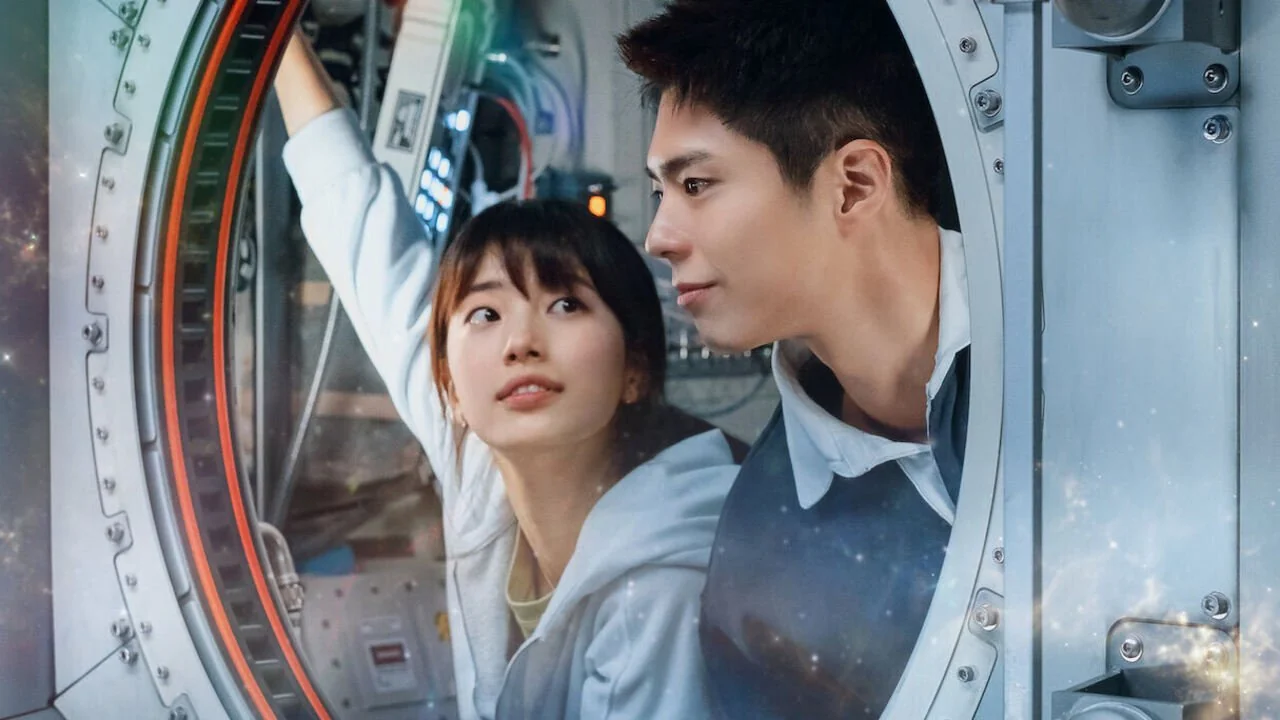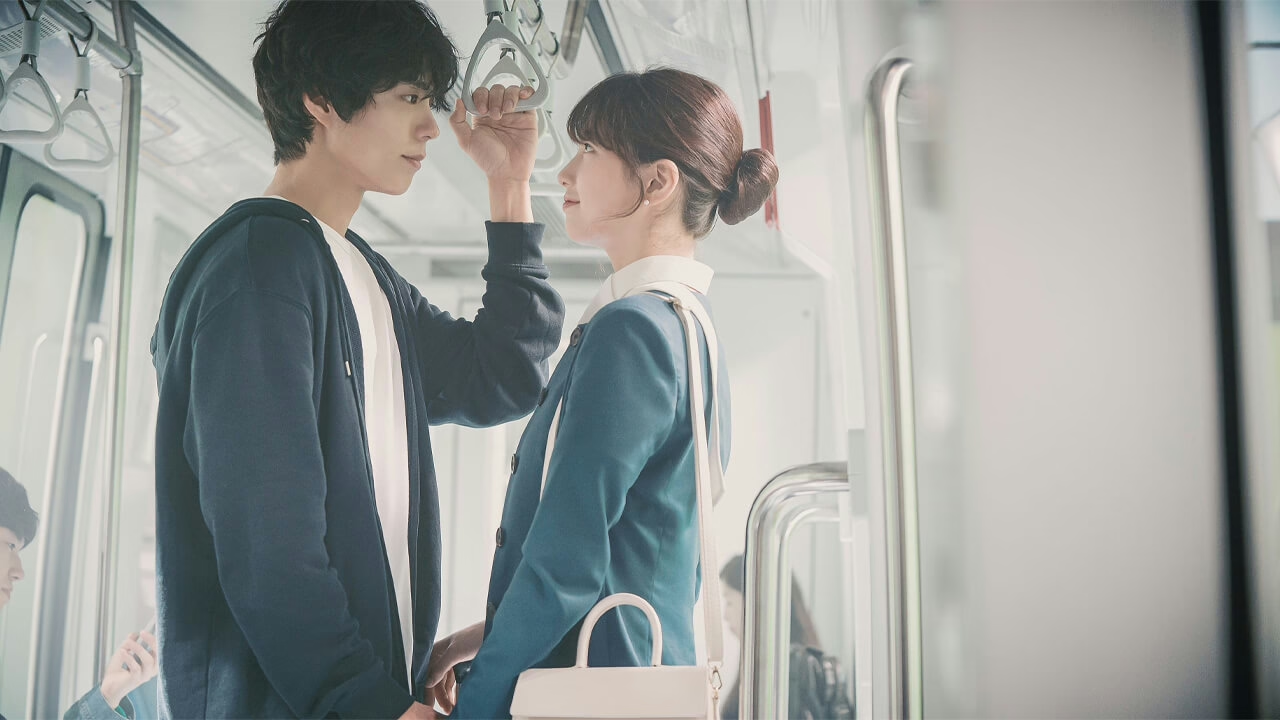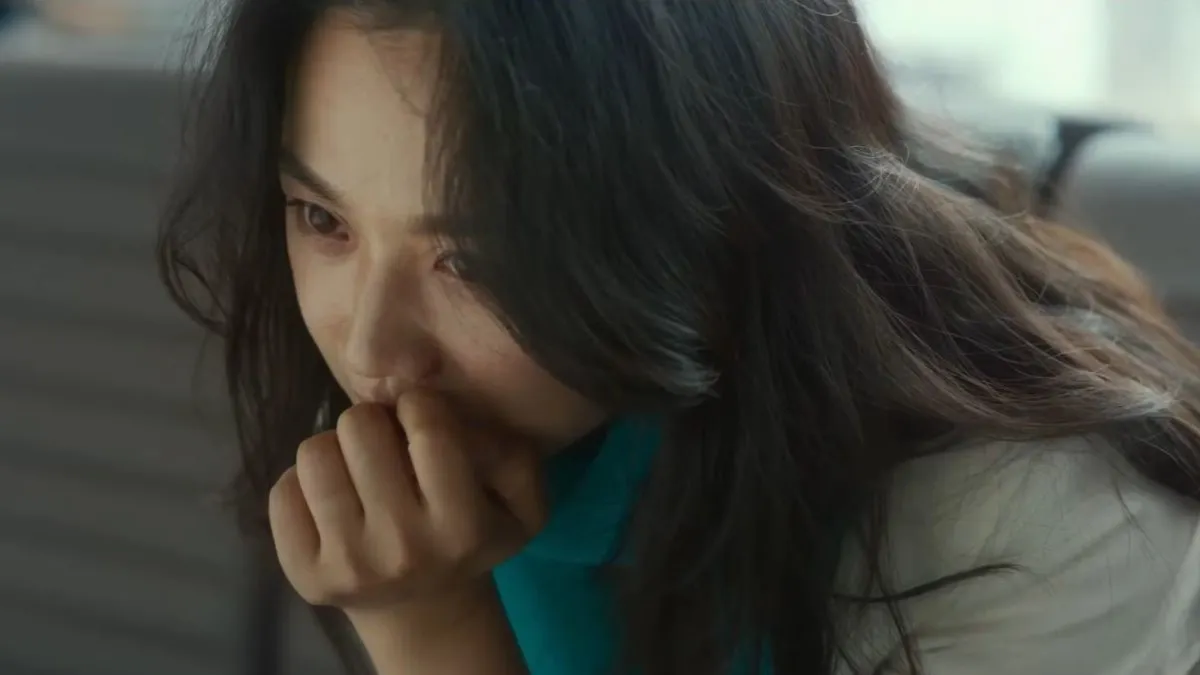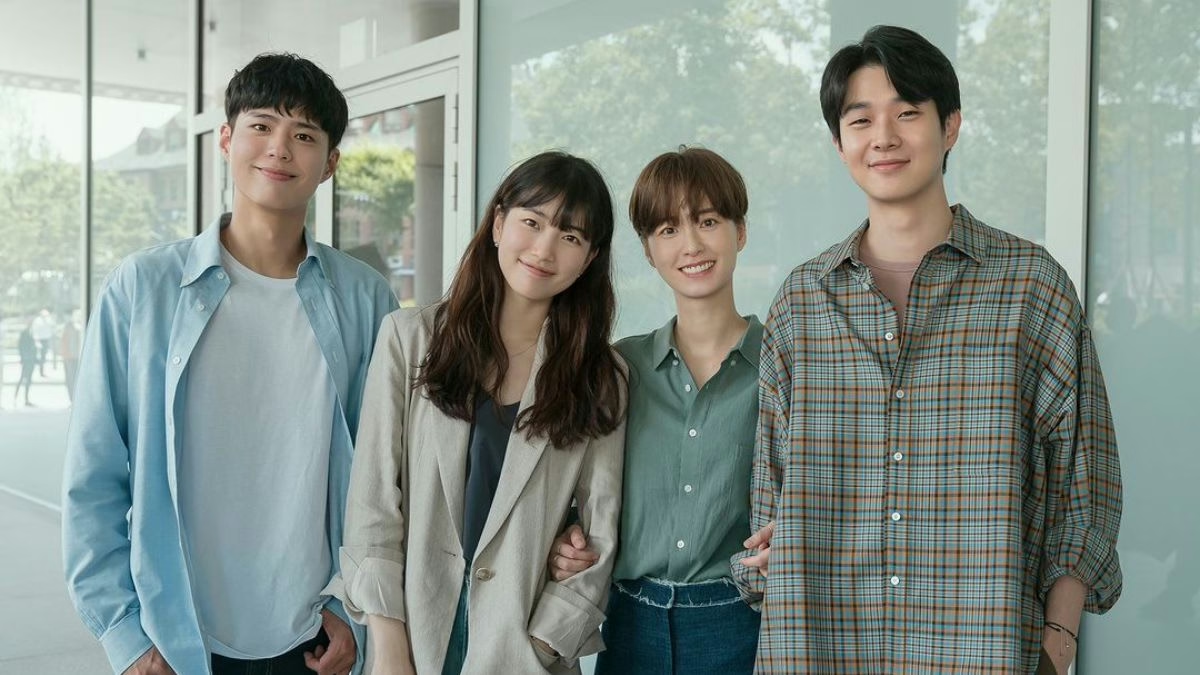What would you do if you could stay connected to lost loved ones through technology? This intriguing question lies at the heart of Wonderland, the new film from Korean director Kim Tae-yong. Set in a not-too-distant future, the story follows several characters experiencing grief who find solace in a revolutionary system called Wonderland. Through uploaded memories and AI recreations, this virtual world allows people to continue relationships even after death.
We meet Bai Li, a driven businesswoman struggling to be fully present for her daughter Jia due to work. When terminal illness strikes, Bai Li joins Wonderland as an archaeologist, hoping to maintain a connection to her child. Jeong-in also signs up after her partner Tae-joo falls into a coma, choosing for him an isolated job as an astronaut that satisfies her conflicting needs to be close yet distant. Behind the scenes are Hae-ri and Hyeon-soo, employee representatives aiding clients while ensuring the stabilized functioning of millions of digital lives.
Masterfully bringing together talents like Tang Wei, Bae Suzy, and Park Bo-gum, Tae-yong’s film is a visual treat. Yet for all its philosophical pondering on life’s impermanence and humanity’s drive to preserve love beyond death, Wonderland suffers from an inconsistent mood and unfinished tales that curb deeper emotional resonance.
While its dreamlike atmosphere and examination of technology’s complex role lend an intriguing quality, this is ultimately a story of relatable grief left partially told. For those seeking exquisite production paired with complete narrative clarity, one may find Wonderland leaves something to be desired.
Connected Through Wonderland
Within the sci-fi world of Wonderland, we follow a few intertwining tales of characters grappling with life and what comes after. There’s Bai Li, a driven businesswoman recently passed who joins the archaeological digs in Wonderland to stay close to daughter Jia.
Flight attendant Jeong-in struggles with loneliness until starting up virtually with comatose love Tae-joo, seeing him as an astronaut far away. Meanwhile, employees Hae-ri and Hyeon-soo work to help people access Wonderland, but deep questions arise around digitally extending life.
Each story touches on heavy themes. Bai Li seeks to right parental wrongs and help Jia cope with loss from afar. Jeong-in clings tightly to the easy familiarity of Tae-joo’s digital doppelgänger, unable to face life alone once he awakens changed. Even employees Hae-ri and Hyeon-soo find their own pasts resurrected through Wonderland, lingering questions around a father Hyeon-soo never knew. As connections between the living and dead stretch on virtually, do any find a way to truly heal and carry on?
Shifting focus amongst these plots gives brief glimpses at poignant topics—life’s impermanence, emotional scars left by absence, the morbid allure of playing house with loss. But diluting attention means few stories receive their due, left feeling half-finished or rushed off too quickly. After peaking interest, certain arcs like Jeong-in’s sudden peter out just as core issues seem poised to boil over.
Wonderland presents a thoughtful what-if, if only it narrowed focus enough to do its thoughtful concepts justice. With time to flesh them out, these characters’ journeys could have resonated far deeper. As it stands, this virtual world leaves some still wondering, wishing to linger longer with its inhabitants exploring life, love, and longing beyond death’s digital shores.
Imagining Tomorrow, Wondering Today
Wonderland crafts an imaginative vision of the near future that feels vibrantly possible. Director Kim Tae-yong chooses to set his film just a few years down the line, allowing the sci-fi concept of digital afterlives to emerge organically from today’s rapidly advancing technology. His characters interact with AI systems and virtual worlds in ways strikingly similar to our present, making their world compellingly relatable.
The concept itself ponders profound questions. What responsibility might we have to lost loved ones, and how would easing grief through technology change family dynamics? By creating personalized simulations, could AI preserve souls or only imitate memories? Intriguing dilemmas arise from Tae-yong’s what-if scenario yet remain unanswered, leaving viewers filling in blanks.
More background building in this world may have deepened impacts. While visuals bring the futuristic setting to life, certain details felt vague. How exactly did this technology develop? What regulation or competition exists? Lacking information risks removing audiences from emotionally-driven character arcs. We appreciate Tae-yong focusing on human stories over exposition, but further establishing rules and realities could have strengthened conceptual musings.
At its best, Wonderland sparks imagination and inner reflection, challenging us to ponder life, death, and our relationships in new light through a lens of imminent technological change. But to fully realize its intriguing premise’s philosophical richness, a bit more world-building context around its sci-fi elements was needed to transport viewers completely. As a starting point for profound what-ifs, however, it proves wonderfully thought-provoking.
A Dream Cast in a Dreamlike World
Director Kim Tae-yong brings his vision of a digital afterlife to life in a uniquely dreamlike style. Wonderland flows with hypnotic visuals and elegant camerawork, pulling you into a world where the line between reality and simulation grows blurry.
Scenes immerse through subtle, beautiful cinematography. Images seem to melt seamlessly into one another with minimal cuts or jarring transitions. It’s easy to get lost gazing at the ethereal deserts Bai Li explores or floating through the vast darkness with Tae-joo. CGI likewise immerses, whether depicting grainy Martian landscapes or futuristic cityscapes.
Oddly, the one sequence out of sync is set in an airport. Perhaps aiming for realism, its artificial lighting and environments stand starkly apart. You remain painfully aware of entering a soundstage rather than Seoul Airport’s bustling terminals. More creative licensing with set design may have maintained the surreal tone better.
Of course, much of the dreamlike power stems from A-list talents embracing each role. Tang Wei, always captivating, brings delicate vulnerability to a mother torn between worlds. Bae Suzy and Park Bo-gum imbue complicated romance with nuanced emotion. Scene-stealing veterans like Jung Yu-mi and Choi Woo-shik add fun quirks.
Under Tae-yong’s guidance, all astronauts, archaeologists, and tech executives feel fully formed—even if their stories remain somewhat underexplored. His casts consistently dazzle, making Wonderland a visual treat, whether pondering life’s profundities or simply admiring incredible talents and fully embracing imaginative roles. Dreams play out through beauty as much as through thought-provoking situations.
Morality in a Virtual Afterlife
Wonderland delves into contemplative territory by examining humanity’s struggle to accept loss. It does so with a melancholic tone that accentuates emotionally fraught moments between the living and dead. Through characters like Bai Li and Jeong-in, the film captures relatable dilemmas over clinging to virtual memories versus finding closure.
Their yearning to hold onto departed loved ones, even through simulation, presents complex questions about technology’s role in grief. The film sympathetically portrays both sides—ghosts clinging to unfinished business, family desperate to ease suffering. Revelations that prolonging contact hinders acceptance of reality feel authentic, pulling heartstrings.
Yet the film sometimes undermines its provocative theme with erratic shifts in mood. Dramatic scenes exploring characters’ turmoil sit alongside slapstick humor that feels out of place. After tender reunions between Bai Li and Jia, for instance, cartoony hijinks with Hae-ri break tension. While brevity prevents exhaustion, lighter bits clash with the contemplative atmosphere established elsewhere.
A more consistent tone would have better served thought-provoking themes on life, death, and morality in a virtual afterlife. As technology increasingly tests boundaries between realms, should the deceased rest in peace? When does keeping memory alive undermine living in the present? By grappling with heady questions more solemnly and cohesively throughout, Wonderland might have lingered longer in the mind.
Still, it deserves credit for tackling philosophically weighty topics with empathy, capturing longing and loss through emotionally complex characters. At its melancholy best, the film stimulates reflection on our human relationship with memory—and what the virtual conservation of souls could mean for grieving and letting go.
Making Connections
Wonderland shows promise in its quiet approach to storytelling. By relying on subtle visuals rather than heavy exposition, it immerses viewers immediately in a world of digital connections. We grasp the technology’s role through short demonstrations, following characters as they navigate video calls with departed loved ones. It’s an atmospheric way to explore this sci-fi premise.
However, splitting focus across too many plotlines undercuts the film’s emotive power. Following different characters means none receive sufficient depth or conclusion. We latch onto Jeong-in and Tae-joo’s longing, only to find their storyline brushed aside halfway, leaving us dangling. Wondering what’s real and what’s fantasy, we look for answers that never come.
By circling through unfinished arcs, the movie fails to make deep connections with audiences. We empathize with characters, then watch helplessly as they’re abandoned. Their dilemmas around grief and memory deserve fuller expressions than vague glimpses allow. Without truly engaging with any one person’s journey, it’s difficult to feel truly invested in the film’s contemplations.
A tighter focus could have remedied this. Choosing to fully explore just one or two experiences may have hit harder emotionally while clarifying the narrative. We would understand one character inside and out, rather than feeling lost among many half-realized people. Developing a single thread with clarity and closure might have left more lasting impacts.
Wonderland shows possibilities for visual sci-fi drama. But spread too thin across incomplete plotlines, it fails to make lasting connections with viewers. A fewer, deeper dives into life within its virtual reality could have profoundly tapped into humanity’s deepest matters of remembrance and loss.
Room for Improvement
Wonderland takes on complex ideas about life, death, and technology’s role. At its best, it immerses us in vivid sci-fi worlds, addressing what it means to reconnect digitally. Some characters even confront uncomfortable truths about grief. You feel Tae-yong grasped fascinating themes.
But good concepts alone don’t make a great film. Wonderland tries weaving too many storylines without resolving them fully. Viewers end up more perplexed than satisfied. We bond with people, only for their arcs to suddenly stop. Without closure or clarity on the fiction’s rules, emotional impact falters.
Visuals and acting abilities are never issues. Seeing stars like Tang Wei and Bae Suzy brought their own allure. Yet technical execution slipped elsewhere—CGI settings looked phony when they shouldn’t. Pacing flew by without explaining the basics up front.
Don’t get me wrong—parts resonated. But loose narrative tying and a rushed formula diluted involvement. These topics cry out for real depth and care. One feels that with polishing, Wonderland could probe what it means to grieve and remember in fascinating ways.
As it stands, potential outweighs fulfillment. But perhaps Tae-yong will revisit these thoughts, honing his craft to match their profound nature. For now, Wonderland shows glimmers of brilliance amidst room for stronger realization. It’s disheartening it didn’t fully click. With refining, this premise seemed primed for greatness.
The Review
Wonderland
With a more focused narrative to give weight to its moving examination of human emotions and digital existence, Wonderland showed glimpses of its potential to profoundly impact viewers. As it stands, the final product feels incomplete.
PROS
- Intriguing premise examining complex themes of grief, death, and technology
- Vivid visual storytelling that immerses the viewer in futuristic worlds
- Features powerful performances from a star-studded cast
- Scenes that effectively tackle emotional truths about coping with loss
CONS
- Overly convoluted narrative with too many unfocused storylines
- Fails to fully resolve character arcs and plot points
- Explanations of its technology and rules are lacking clarity.
- Pacing suffers from not properly setting up context from the start.





















































Discussion about this post